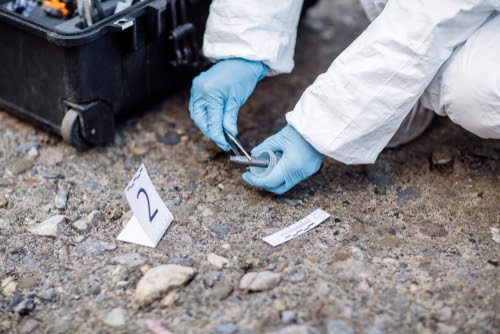Are you a fan of suspense movies or detective stories? You can be that main character—and more importantly, understand what’s fictional and what isn’t—by pursuing enrolling in a Doctor of Criminology program.
A Doctor of Philosophy (Ph.D.) program in Criminology deals with crime from a sociological perspective. A Doctor of Criminology collects, analyzes, and studies all crime data for purposes of research and to substantiate policymaking proposals. D.Crim. Degree holders are also into academic work.
______________________________
Best Doctor of Criminology Degrees
UNIVERSITY OF PENNSYLVANIA

DOCTOR OF PHILOSOPHY IN CRIMINOLOGY
School Highlights: At the University of Pennsylvania, the Ph.D. in Criminology provides an interdisciplinary approach to the field with a strong emphasis on producing informed policy relevant to empirical scholarship.
Students create an individual research focus that includes coursework in sociology, law, demography, and criminology. It is a four-year program that is completed under close guidance and supervision from faculty mentors.
This impressive university is one of the most popular in the country. Its success as an educational institution is reflected clearly in the retention and graduation rates listed below, which are exceedingly high compared to most other schools. The curriculum is designed for students who have received at least a bachelor’s degree.
Coursework Sample:
- Criminology Theory
- Criminology and Public Policy
- Applied Statistics
Campus Location: Philadelphia, PA
Accreditation:
- Middle States Commission on Higher Education
3624 Market Street, Suit 2 West
Philadelphia, PA 19104
www.msche.org, (297) 284-5000
Acceptance Rate: 6% Retention Rate: 97% Graduation Rate: 96%
LEARN MORE ABOUT THE UNIVERSITY OF PENNSYLVANIA’S DOCTOR OF PHILOSOPHY IN CRIMINOLOGY
ARIZONA STATE UNIVERSITY

CRIMINOLOGY & CRIMINAL JUSTICE, PH.D.
School Highlights: Arizona State University’s School of Criminology and Criminal Justice provides a Doctor of Philosophy emphasizing theory, policy, and research. The curriculum is structured around five key components of the discipline.
These include theory and research, analytical technique, elective coursework, a comprehensive examination, and a dissertation. The program is maintained and instructed by nationally ranked faculty members who bring a wide range of expert information to the classroom.
The Criminology and Criminal Justice Ph.D. is a 72-credit, on-campus degree. Students are free to transfer up to 30 credits from a master’s degree or Juris Doctorate, and there are fascinating elective options that personalize the approach. ASU is an immensely popular school that is well-known across educational platforms.
Coursework Sample:
- Advanced Statistical Analysis
- Special Problems in Quantitative Methods
- Seminar on Criminal Justice Policies and Practices
Campus Location: Tempe, AZ
Accreditation:
- Higher Learning Commission
230 South LaSalle Street, Suite 7-500
Chicago, Illinois 60604
www.hlcommission.org, (800) 621-7440
Acceptance Rate: 88% Retention Rate: 86% Graduation Rate: 66%
LEARN MORE ABOUT ARIZONA STATE UNIVERSITY’S CRIMINOLOGY & CRIMINAL JUSTICE, PH.D.
TEXAS STATE UNIVERSITY

DOCTORAL PROGRAM IN CRIMINAL JUSTICE
School Highlights: The Criminal Justice doctoral degree at Texas State University is offered as a Ph.D. that is well-suited to academic and criminal justice professionals. The School of Criminal Justice and Criminology has three master’s programs in the same field that include exciting specializations such as the Executive Concentration.
TSU is in a prime location for students in this particular field. Founded in the central Texas corridor, it is well-connected to numerous criminal justice offices, headquarters for law enforcement, criminal courts, and correctional facilities.
Graduates exit this fine school with a well-developed list of professional contacts to support their newly enhanced careers. Texas State creates leaders in public policy, education, and administration.
Coursework Sample:
- Philosophy of Law, Justice, and Social Control
- Advanced Criminological Theory
- Race and Ethnicity in Crime and Criminal Justice
Campus Location: San Marcos, TX
Accreditation:
- Higher Learning Commission
230 South LaSalle Street, Suite 7-500
Chicago, Illinois 60604
www.hlcommission.org, (800) 621-7440
Acceptance Rate: 70% Retention Rate: 80% Graduation Rate: 54%
LEARN MORE ABOUT TEXAS STATE UNIVERSITY’S DOCTORAL PROGRAM IN CRIMINAL JUSTICE
CALIFORNIA UNIVERSITY OF PENNSYLVANIA

ONLINE DOCTORATE IN CRIMINAL JUSTICE (D.C.J.)
School Highlights: California University of Pennsylvania’s Doctorate in Criminal Justice program is incredibly unique.
It was the first regionally accredited degree of its kind in the nation, the first to be acknowledged by the United States Department of Education, and can be earned entirely online. Applicants to the program must hold a master’s degree in criminology, criminal justice, or another relevant discipline, such as anthropology or law.
The degree prepares students to take on leadership roles in sheriff’s offices, juvenile justice agencies, correctional departments, and investigative units in district attorneys’ offices. The curriculum supplies fascinating course topics offered at very few other colleges and universities of criminal justice. Some exciting examples can be found in the coursework sample below.
Coursework Sample:
- Contemporary Forensic Science and Technology for Criminal Justice Leaders
- Civil Liability for Criminal Justice Professionals
- Achieving Justice More Oten
Campus Location: California, PA
Accreditation:
- Middle States Commission on Higher Education
3624 Market Street, Suit 2 West
Philadelphia, PA 19104
www.msche.org, (297) 284-5000
Acceptance Rate: 97% Retention Rate: 70% Graduation Rate: 50%
LEARN MORE ABOUT CALIFORNIA UNIVERSITY OF PENNSYLVANIA’S ONLINE DOCTORATE IN CRIMINAL JUSTICE
SAINT LEO UNIVERSITY

ONLINE DOCTOR OF CRIMINAL JUSTICE DEGREE
School Highlights: There are two concentration options available for students completing the online Doctor of Criminal Justice at Saint Leo University.
The Education specialization is an excellent choice for academic professionals, researchers, and professors seeking further advancement. Homeland Security is geared toward students who want to advance their careers, knowledge, and professional practice generally.
The core curriculum provides a comprehensive approach to the field and emphasizes complex decision-making and problem-solving. While the bulk of the 60 credit hours of coursework is completed online, three residency requirements are scheduled throughout the program.
Graduates go on to fill a wide variety of roles in criminal justice, whether they are teachers or professionals responsible for the safety of the United States.
Concentration Options:
- Education
- Homeland Security
Campus Location: St. Leo, FL
Accreditation:
- Higher Learning Commission
230 South LaSalle Street, Suite 7-500
Chicago, Illinois 60604
www.hlcommission.org, (800) 621-7440
Acceptance Rate: 71% Retention Rate: 64% Graduation Rate: 45%
LEARN MORE ABOUT SAINT LEO UNIVERSITY’S ONLINE DOCTOR OF CRIMINAL JUSTICE DEGREE
Frequently Asked Questions
What does a Doctor of Criminology do?
A criminologist generally studies criminals and the crimes they commit. It is their job to analyze a crime based on the evidence gathered or extracted from the scene.
A Doctor of Criminology treats these pieces of evidence as essential data that not only help investigators and authorities uncover essential information to apprehend offenders but also assist in drafting laws that prevent crimes from being committed again, rehabilitate offenders, and, ultimately, mitigate criminal behavior.
Criminologists typically work as police officers, prison wardens, detectives, community development workers, probation officers, court judges, and lawyers specializing in criminal law. Many of them work in universities too as professors and researchers.
Doctor of Criminology graduates, on the other hand, have in-depth knowledge of criminal law, sociology, psychology, and forensics. They do research-intensive work to interpret data and discover how they can be useful from a sociological standpoint.
What sort of accreditation should I look for in a D.Crim. school?
Regional accreditation committees govern doctorate programs for Criminology. Schools are recognized by an accreditation body that is approved by the Commission of Higher Education Accreditation (CHEA).
If you plan to enroll in an online school, make sure it is certified by the Distance Education Accrediting Commission (DEAC). Remember that accreditation is essential for measuring how your school fares as an academic institution.
Although no specific group accredits Criminology as a discipline, you can check if the school and its faculty members are affiliated with The American Society of Criminology. Membership in this organization assures you that your professors have the right credentials and are utilizing techniques and tools that align with the latest developments in Criminology.
How do I earn my D.Crim. Degree?
Crim is a research-oriented doctorate. Most schools award the “Doctor of Philosophy in Criminology (Ph.D.)” to scholars in this field. Others award the “Doctor of Criminal Justice (DCJ)” as a similar title.
Whether D.Crim., DCJ, or Ph.D., a doctorate in Criminology is an attractive option for police officers, lawyers, and researchers seeking advanced positions in government offices, law firms, and academia.
Typically, a doctoral program in Criminology lasts for three to four years if you hold a master’s degree in a relevant field. Some schools admit bachelor’s degree holders through a straight program along with a master’s diploma in the middle. This program consists of coursework and a dissertation. A Criminology graduate student also needs to have a specialization field such as translational criminology, national security, or cybercrime.
There are slight differences between the dissertation requirements of a Doctor of Criminal Justice (DCJ) and a holder of a Ph.D. in Criminology, with the latter being more academically sophisticated. DCJ dissertation is reviewed only after completion; on the other hand, a Ph.D. dissertation requires publication in a peer-reviewed journal.
What type of degree do I need to pursue research or educate others in Criminology?
Whether it’s DCJ, D.Crim, or a Ph.D., anyone with a doctorate in Criminology is eligible to teach in graduate schools. Other scholars from the fields of sociology, psychology, criminal law, statistics, and information technology may also educate and train future criminologists. As circumstances surrounding acts of crime have become more complicated, Criminology has ventured into interdisciplinary approaches.
There are many Criminology journals currently in circulation. Any scholar interested in studying crimes may add them to the towering pile of criminology literature.
How do I earn a transitional or bridge D.Crim. Degree?
Many doctorate programs in Criminology across the US provide online classes either in an entirely distant learning set-up or a hybrid format. Some schools prefer the traditional didactic landscape in their curriculum. The online option is a feasible choice for applicants who want to pursue doctorate study and carry on with work or career at the same time.
What kind of career and salary can I expect with my D.Crim. Degree?
A bachelor’s or master’s degree in Criminology lets you work on criminal investigations and in correction facilities. Those with a doctorate take on leadership roles. Your D.Crim., DCJ, or Ph.D. in Criminology can lead to careers in research, government agencies, politics, consultation, academia, and policymaking.
A criminologist with an educational background above those of a master’s degree can earn up to $122,000 per year. According to the Bureau of Labor Statistics, criminologists and sociologists earn as much as $166,040 annually. Depending on tenure, location, and years of experience, a criminologist’s earnings may grow higher.
Do I need a license to be a criminologist?
Most states require undergraduates majoring in Criminology, Sociology, or Psychology to pass the licensure exam to enter in Criminology practice. Current trends show that most Criminology graduates proceed to earn a master’s program in the behavioral sciences to advance their careers.
For D. Crim, DCJ, or Ph.D. in Criminology graduates, your diplomas are enough to teach in a university. Finishing these degrees entails a commitment to research in the field.
What schools offer Doctor of Criminology degrees?
A Conventional brick-and-mortar Criminology program is offered in the University of Pennsylvania in Philadelphia, Pennsylvania which offers the Ph.D. in Criminology. Arizona State University in Phoenix, Arizona awards the Ph.D. in Criminology and Criminal Justice title while Texas State University in San Marcos, Texas offers the Doctor in Criminal Justice degree.
You can also enroll in the 100% online doctorate program in Criminology offered by the University of California in Pennsylvania in California, Pennsylvania and Saint Leo University in St. Leo, Florida. These schools admit students who want to study at their own pace. These online school’s Summer Programs require at least five days of on-campus attendance.
Research is powerful enough to curb crimes. Make your mark in this field by enrolling in a Doctor of Criminology program.
